Rose Castle Foundation Encourages Princeton Students to Become ‘Agents of Reconciliation’
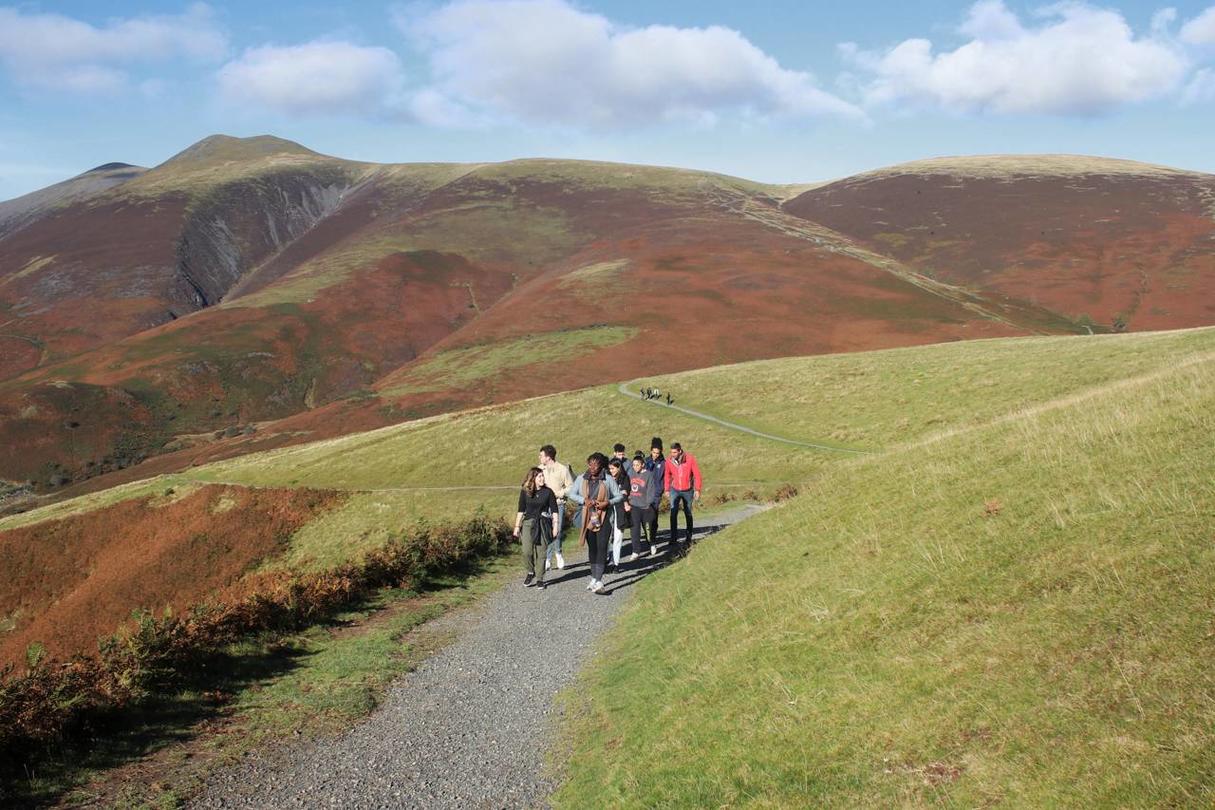
Photo by Neil Satchwell-Smith
This fall break, 16 Princeton students from different backgrounds, faith traditions and political orientations convened at a castle in England to learn how people with opposing viewpoints can come together across differences.
The goal of their weeklong instruction at the innovative Rose Castle Foundation (RCF) was to begin to understand how to create tolerant spaces for others — “spaces in which we we can disagree substantially, without walking away,” said RCF cofounder Sarah Snyder.
Rose Castle is located in Cumbria, about midway between Manchester and Glasgow, in England’s Lake District. While it runs programs for university students, it primarily hosts adults from around the globe for group training in reconciliation and transforming conflict. The foundation recently welcomed a gathering of Ukrainians and Belarusians on different sides of the Ukraine war.
The foundation’s programs are designed to send participants back home to be “reconcilers” in their own communities. This fall’s trip was the third time Princeton students have attended for group instruction.
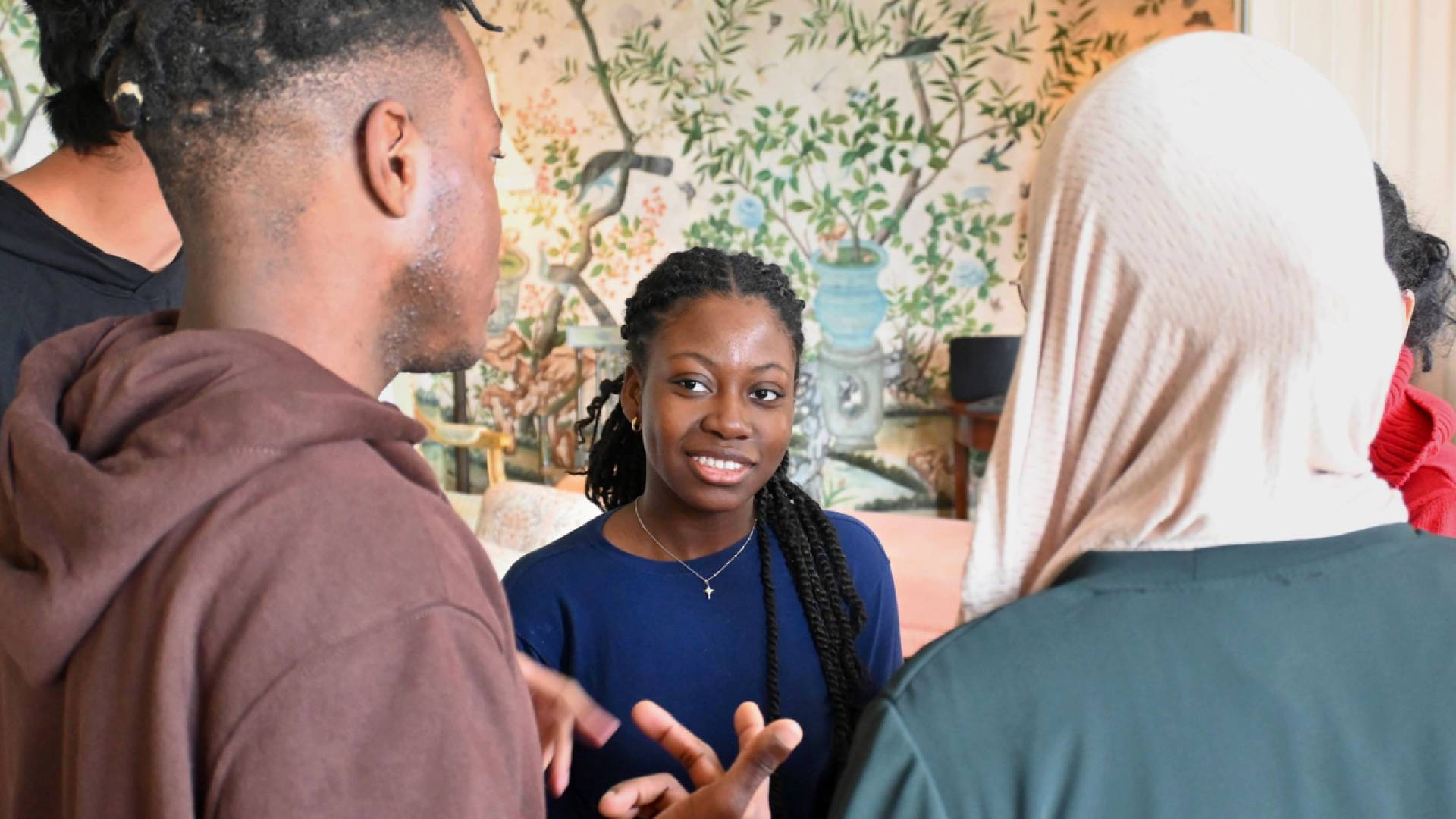 Princeton students have visited the Rose Castle Foundation since 2019 on fall break trips to gain concrete skills for reconciliation. Pictured: Brian Mmari ’25, Davina Thompson ’25 and Givarra Azhar Abdullah ’26 during a break between learning sessions on this fall’s trip.
Princeton students have visited the Rose Castle Foundation since 2019 on fall break trips to gain concrete skills for reconciliation. Pictured: Brian Mmari ’25, Davina Thompson ’25 and Givarra Azhar Abdullah ’26 during a break between learning sessions on this fall’s trip.Photo by Georgia May
“The goal is not to get to agreement on anything,” said Alison Boden, dean of religious life and the Chapel at Princeton, who first took Princeton students to Rose Castle in 2019 and led this fall’s trip. “The goal is to create a relationship — that’s it. … We want to do basic training about how to be agents of reconciliation.”
One signature activity focuses on issues of real-world conflict that the group chooses during the trip. Working in groups of six, two students take one side, two take the other side, and the remaining two take turns being the reconciler who facilitates the conversation.
This year’s group focused on abortion, Israeli-Palestinian relations, and free speech. Issues in previous years have included immigration, affirmative action, and cancel culture, among others.
“Being at Rose Castle with people who I disagree with has taught me to slow down, breathe, recenter myself and go into it with the curiosity of wanting to learn instead of wanting to shut them out,” said Emmie Pickerill, a member of the Class of 2025 who participated in this year’s trip.
Four days after their return, the group filled two giant pieces of butcher paper with ideas of what they would like to do next, including inviting student leaders of a wide variety of groups to come together to experience some of the reconciliation exercises.
Boden has invited Snyder to campus for a two-day immersive Wintersession seminar in January, open to students, faculty and staff. Details will be available on the Wintersession website when registration opens Dec. 11.
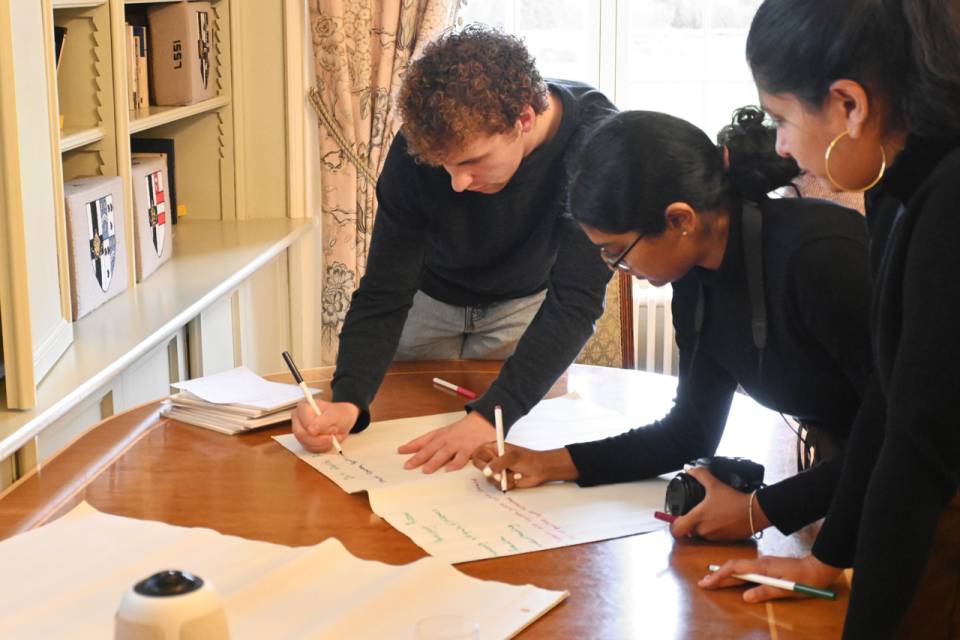 Gabriel Gullett ’25 (left), Aishwarya Swamidurai ’26 and graduate student Haneen Khalid participate in a small group exercise for facilitating dialogue on the 2023 trip.
Gabriel Gullett ’25 (left), Aishwarya Swamidurai ’26 and graduate student Haneen Khalid participate in a small group exercise for facilitating dialogue on the 2023 trip.Photo by Georgia May
Promoting free speech and inclusivity
Princeton University promotes a culture of free speech and inclusivity where people of every background feel welcome to engage in vibrant discussion and argument. In 2015, the University adopted the Chicago Principles on freedom of expression, and incoming students attend an orientation program on free speech.
In this fall’s program, President Eisgruber was joined in conversation by Anthony Romero of the Class of 1987, Executive Director of the ACLU. In fall 2022, Eisgruber highlighted the University’s statement on free expression. Princeton is working in a partnership with PEN America, a worldwide champion for free expression, to conduct workshops about free expression and academic freedom on campus.
Rose Castle facilitator Hannah Larn, who worked with Princeton students in England this year and last fall, said there’s a clear advantage to practicing difficult conversations and learning to bridge differences as a student.
“On the university campus, you have an incredible spread of political diversity, religious diversity, ethnic diversity. You have people who have grown up in very different economic situations,” she said. “We’re able to give students an experience at this time in their lives when they have access to that diversity, which they may well not have once they leave campus.”
Larn hopes they’ll take that experience with them into their lives and careers. “If they end up in positions of leadership, in business, in government, that’s going to have a huge impact,” she said.
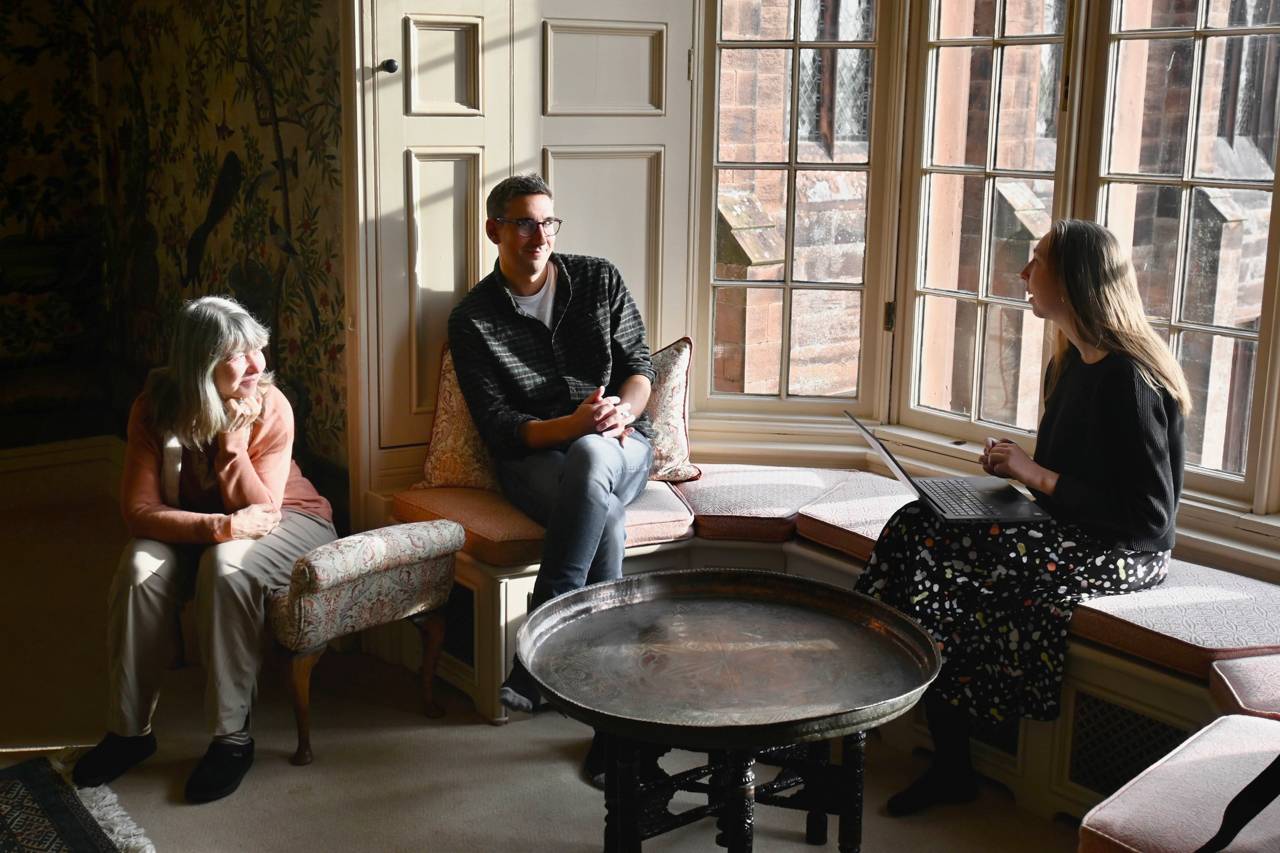 Alison Boden (left), dean of religious life and the Chapel at Princeton, and Rose Castle Foundation staff members Robbie Leigh and Phoebe Dill review an exercise shortly before it begins during the 2023 trip.
Alison Boden (left), dean of religious life and the Chapel at Princeton, and Rose Castle Foundation staff members Robbie Leigh and Phoebe Dill review an exercise shortly before it begins during the 2023 trip.Photo by Georgia May
Practicing ‘radical hospitality’
The cornerstone of the Rose Castle Foundation experience is “radical hospitality,” Larn said, which “opens up spaces for us to learn how to disagree well, for us to be OK with difference.”
One workshop this fall helped students recognize and develop a dozen traits — including curiosity, vulnerability, empathy, forgiveness and generosity — that RCF has identified that enable people to reach beyond their own group to build bridges across divides. Pickerill said these “12 Habits of a Reconciler” were among her favorite lessons.
Each student was asked to identify one habit as a particular personal strength and another as a habit they need to work on. Pickerill chose “hopefulness” as her strength and has been working on “lament,” which RCF defines as being able to “name and mourn hurt and injustice when it occurs, both in the world and in ourselves, and acknowledging that there may not be any viable solution.”
“My gut reaction is still, if I hear something I disagree with, to get a knot in my stomach and I just want to leave,” she said. “But now a second thought comes: Wait, is there something deeper to this? Where is this person coming from?”
Bridging differences on campus
After Boden took her first group of Princeton students to Rose Castle in 2019, “they wanted to keep going when they got back to campus,” she said.
The group formed the Princeton Rose Castle Society (PRCS), meeting regularly over dinner to engage in the same kinds of small group discussions they’d had in the UK. They invited new members each year and kept the group going over Zoom through the pandemic, with some of the students becoming leaders for the newcomers.
When students couldn’t travel because of the pandemic, Boden was able to invite Snyder and another program facilitator, Phoebe Dill, to Princeton to offer training.
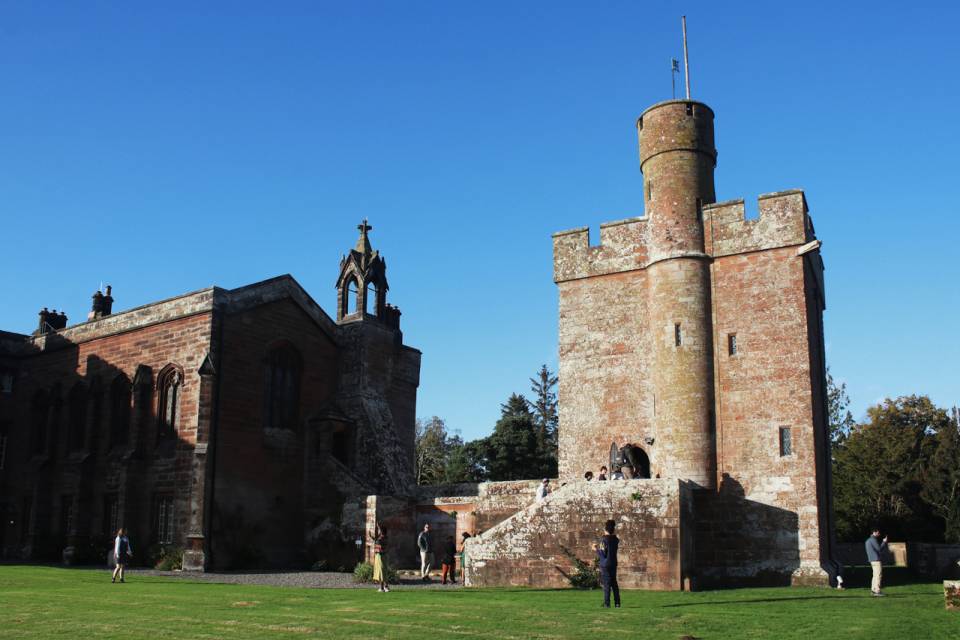 Students explore Rose Castle’s 14th century Strickland Tower on the 2022 trip. The castle itself was built in the early 13th century and is now home to the Rose Castle Foundation, which runs programs for group training in reconciliation and transforming conflict.
Students explore Rose Castle’s 14th century Strickland Tower on the 2022 trip. The castle itself was built in the early 13th century and is now home to the Rose Castle Foundation, which runs programs for group training in reconciliation and transforming conflict.Photo by Neil Satchwell-Smith
Snyder is a Cambridge University theologian and trained mediator, who brings significant experience working with senior faith leaders around the world. She served as the Archbishop of Canterbury’s adviser for reconciliation from 2016 to 2020, overseeing his responses to peace-building and longer-term reconciliation in contexts of violent conflict, including in the Middle East, Africa, Southeast Asia and Eastern Europe.
She has returned to the Princeton campus several times and said that one critical area of her work with PRCS is to help students navigate difference “across the conservative-progressive (liberal) cultural-ideological spectrum, which is vital preparation for leadership in and beyond Princeton.”
She continued: “Princeton students never cease to inspire and amaze us with their ability to push beyond comfort zones in order to listen to others with very different perspectives.”
Carrying a new mindset forward
Naomi Frim-Abrams, a 2023 graduate and co-founder of PRSC, was a first-year student on the 2019 trip to Rose Castle. She said she came back to campus better equipped to handle difficult conversations, whether one-on-one with friends or as part of the student-led groups she was involved with.
This mindset takes practice, Frim-Abrams said. “I really wanted to bring a new form of dialogue to Princeton, especially with people who you assume you are going to disagree with and aren’t able to have a relationship with.”
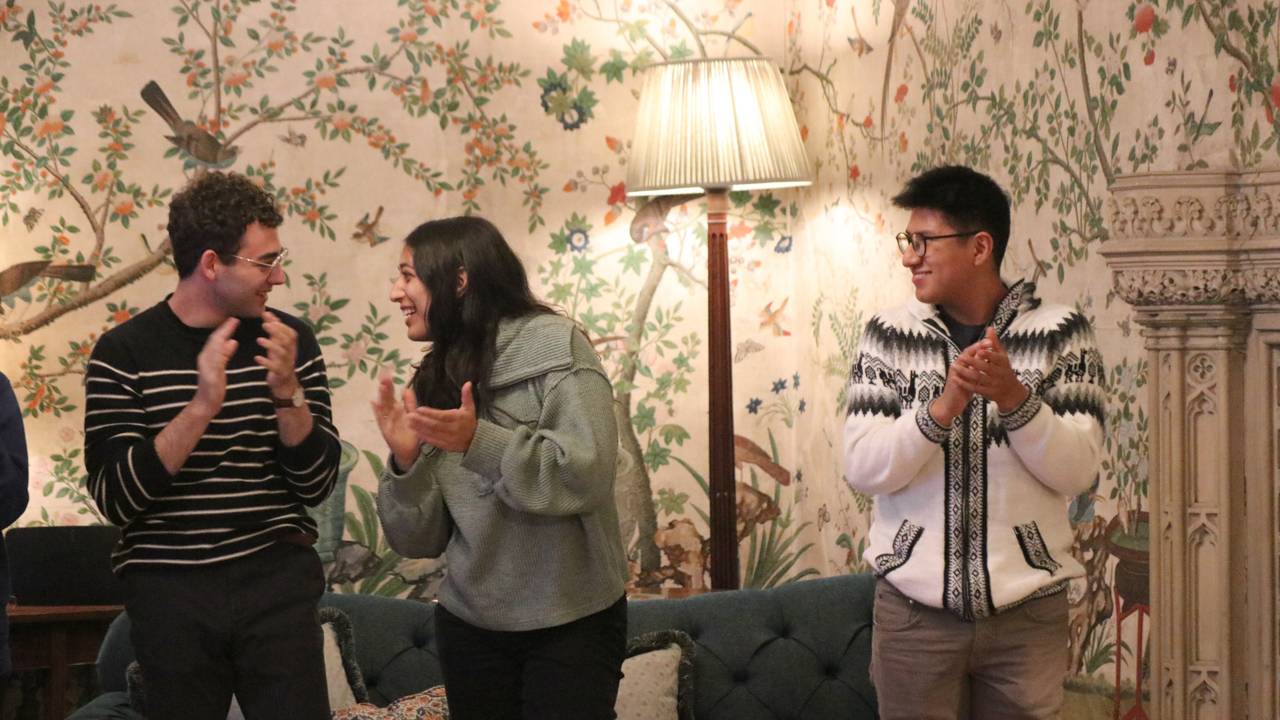 Myles McKnight ’23 (left), Esha Jain ’23 and Gustavo Blanco-Quiroga ’25 applaud at the end of a dialogue session during the 2022 trip.
Myles McKnight ’23 (left), Esha Jain ’23 and Gustavo Blanco-Quiroga ’25 applaud at the end of a dialogue session during the 2022 trip.Photo by Neil Satchwell-Smith
She is now a research fellow at the Center for Human Rights, Multiculturalism, and Migration in Jember, Indonesia, and sees reconciliation as being directly applicable to the issue of migration. “You have strangers now living in the same neighborhood,” she said, “and they’re coming from completely different religious, cultural, political backgrounds.”
“Before Rose Castle, I was scared to even try to have a conversation with someone who had a different political or religious viewpoint,” Frim-Abrams recalled. “But once you learn that if you approach someone with real curiosity about what they’re saying, even if you’re never going to agree with them, if you understand how to take a step back when things are getting too much and acknowledge that sometimes we have to [prioritize] the relationship over the conversation, it’s less scary.”
